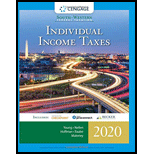
Individual Income Taxes
43rd Edition
ISBN: 9780357109731
Author: Hoffman
Publisher: CENGAGE LEARNING - CONSIGNMENT
expand_more
expand_more
format_list_bulleted
Question
Chapter 4, Problem 51P
To determine
Identify the tax consequences to Person V and Incorporation V, in the given situations.
Expert Solution & Answer
Want to see the full answer?
Check out a sample textbook solution
Students have asked these similar questions
Golden Harvest Restaurant had a 12% return on a $60,000 investment in new dining furniture.
Can you solve this financial accounting question using valid financial methods?
General accounting
Chapter 4 Solutions
Individual Income Taxes
Ch. 4 - According to the Supreme Court, would it be good...Ch. 4 - Prob. 2DQCh. 4 - Prob. 3DQCh. 4 - Ben lost his job when his employer moved its...Ch. 4 - Howard buys wrecked cars and stores them on his...Ch. 4 - On December 29, 2019, an employee received a 5,000...Ch. 4 - Prob. 7DQCh. 4 - A Series EE U.S. government savings bond accrues...Ch. 4 - The taxpayer performs services with payment due...Ch. 4 - Wade paid 7,000 for an automobile that needed...
Ch. 4 - Prob. 11DQCh. 4 - Prob. 12DQCh. 4 - A divorce agreement entered into in 2017 requires...Ch. 4 - Prob. 14DQCh. 4 - Patrick and Eva are planning to divorce in 2019....Ch. 4 - Prob. 16DQCh. 4 - Prob. 17DQCh. 4 - Prob. 18DQCh. 4 - Prob. 19DQCh. 4 - Prob. 20DQCh. 4 - On January 1, 2019, Kunto, a cash basis taxpayer,...Ch. 4 - Bigham Corporation, an accrual basis calendar year...Ch. 4 - LO.3 Simba and Zola are married but file separate...Ch. 4 - Casper and Cecile divorced in 2018. As part of the...Ch. 4 - LO.4 Elizabeth made the following interest-free...Ch. 4 - Prob. 26CECh. 4 - Prob. 27CECh. 4 - Prob. 28PCh. 4 - Prob. 29PCh. 4 - Determine the taxpayers gross income for tax...Ch. 4 - Prob. 31PCh. 4 - Prob. 32PCh. 4 - Prob. 33PCh. 4 - Your client is a partnership, ARP Associates,...Ch. 4 - Trip Garage, Inc. (459 Ellis Avenue, Harrisburg,...Ch. 4 - Prob. 36PCh. 4 - Marlene, a cash basis taxpayer, invests in Series...Ch. 4 - Drake Appliance Company, an accrual basis...Ch. 4 - Freda is a cash basis taxpayer. In 2019, she...Ch. 4 - Prob. 40PCh. 4 - Prob. 41PCh. 4 - Troy, a cash basis taxpayer, is employed by Eagle...Ch. 4 - Prob. 43PCh. 4 - Prob. 44PCh. 4 - Prob. 45PCh. 4 - Nell and Kirby are in the process of negotiating...Ch. 4 - Alicia and Rafel are in the process of negotiating...Ch. 4 - Prob. 48PCh. 4 - Prob. 49PCh. 4 - Prob. 50PCh. 4 - Prob. 51PCh. 4 - Prob. 52PCh. 4 - For each of the following, determine the amount...Ch. 4 - Prob. 54PCh. 4 - Prob. 55PCh. 4 - Linda and Don are married and file a joint return....Ch. 4 - Charles E. Bennett, age 64, will retire next year...Ch. 4 - Donna does not think she has an income tax problem...Ch. 4 - Prob. 1RPCh. 4 - Prob. 2RPCh. 4 - Prob. 3RPCh. 4 - Prob. 1CPACh. 4 - Fred and Wilma were divorced in year 1 (before...Ch. 4 - Bill and Jane Jones were divorced on January 1,...Ch. 4 - Jake pays the following amounts to his former...Ch. 4 - Mary purchased an annuity that pays her 500 per...
Knowledge Booster
Similar questions
- Can you explain the correct methodology to solve this financial accounting problem?arrow_forwardIf the company uses full costing, the ending inventory for the year would be valued at ______.arrow_forwardAlicia Logistics purchased a conveyor belt system for its distribution center at a cost of $105,800. The system has an estimated residual value of $8,600 and an estimated useful life of 12 years. What is the amount of the annual depreciation computed by the straight-line method?arrow_forward
arrow_back_ios
SEE MORE QUESTIONS
arrow_forward_ios
Recommended textbooks for you
 Individual Income TaxesAccountingISBN:9780357109731Author:HoffmanPublisher:CENGAGE LEARNING - CONSIGNMENT
Individual Income TaxesAccountingISBN:9780357109731Author:HoffmanPublisher:CENGAGE LEARNING - CONSIGNMENT


Individual Income Taxes
Accounting
ISBN:9780357109731
Author:Hoffman
Publisher:CENGAGE LEARNING - CONSIGNMENT



